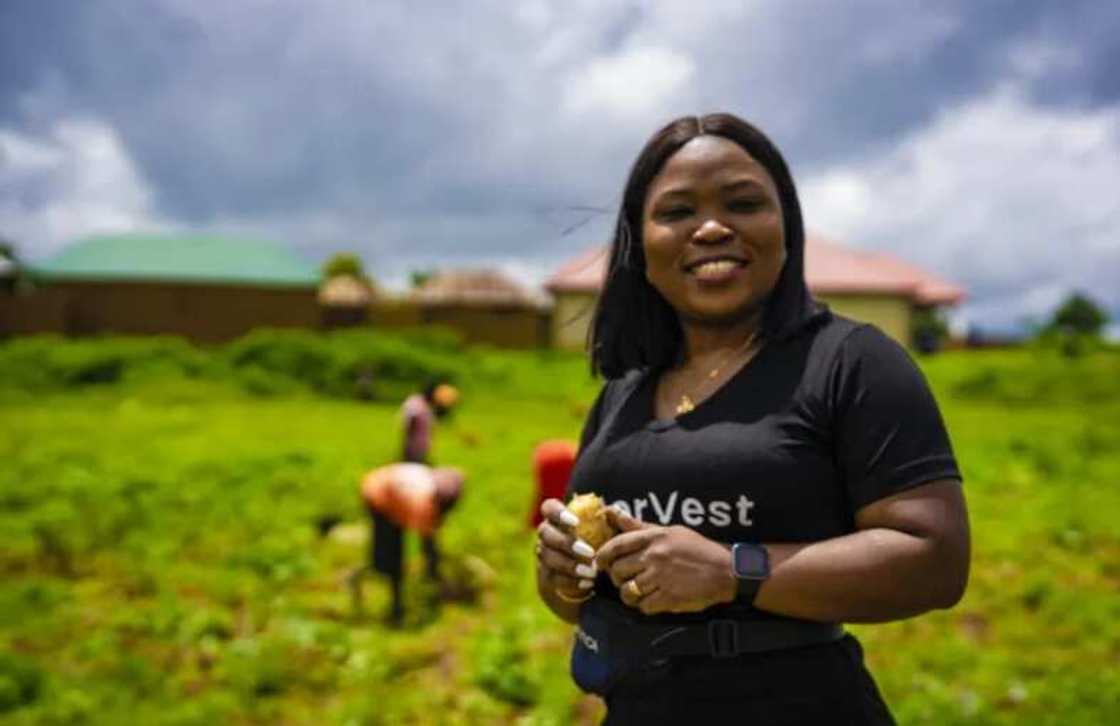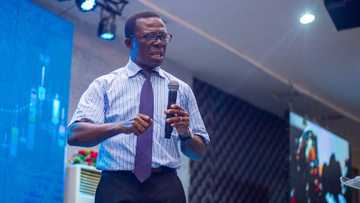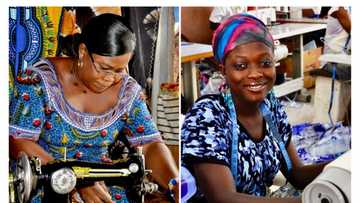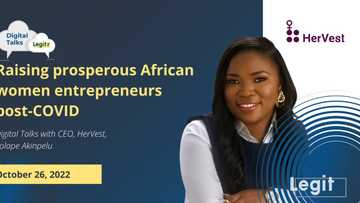"We Need More African Women to Participate in Financial Services" - Solape Akinpelu, CEO of HerVest
- A lot of women around the world, especially in the African continent, are financially excluded and underserved
- HerVest is one startup currently increasing women's financial inclusion in developing countries.
- "Getting more women to be financially inclusive will help them contribute their quote to global economy," Solape Akinpelu says.
PAY ATTENTION: Сheck out news that is picked exactly for YOU ➡️ find the “Recommended for you” block on the home page and enjoy!
Gender inequality and biases as regards economics and financial inclusion is a conversation that has lingered for a long time. One organisation that is stepping up to raise a generation of prosperous African women through financial inclusion is HerVest.
HerVest is a social enterprise providing financial inclusion for women through a Gender Lens approach. HerVest is built to help women everywhere take control of their finances one impact at a time.
During an interview on Legit.ng’s flagship programme, Digital Talks, Solape Akinpelu, Co-founder/CEO of HerVest, talks about how the platform improves women’s lives through greater access to and use of financial services.

Source: Getty Images
PAY ATTENTION: Join Legit.ng Telegram channel! Never miss important updates!
Tell us about HerVest and what motivated the establishment of the platform.
I would say that HerVest is a story of insight leading to actions. If you had asked me five years ago if I would be doing this, the answer would have been a big “NO”, because my background has been in marketing and love marketing. I started marketing as a copywriter from the agency before I moved to what we call the client side, working with an investment company, Meristem Nigeria. With marketing, it has to do with the behaviours of people. And right from the agency side to when I moved to the client side, I was constantly looking into the numbers as a marketer. You want to look into the numbers, the demographic, and that’s when I realised that a lot of women were not consuming financial services. And that way it was underwhelming, not just for the women, but our economic capacity as a nation and as a globe. It is not a Nigerian problem. It is not an African problem, but it is acute here. It is a global thing and that is when we decided to do something and look at financial services from a gender lens perspective. And that’s what HerVest is doing.
What are the packages and benefits that HerVest offers?
As of today, we have about 30,000 women using HerVest. Our model is an inclusive one. It’s easier for myself and my female colleagues here because of our education level and maybe because we may have some income to participate in financial services. It’s harder for a woman who lives in a rural area who is constantly thinking about where the next meal is going to come from to adopt financial services because really, how do you save what you do not have? So with HerVest, we have a model that caters to financially excluded women and financially underserved women. If you look at rural areas, they are usually agrarian, and so we have at the moment, over 10,000 female farmers in our network and about 20,000 users on our mobile application user net. So speaking precisely about the services, women using the mobile application can participate in financial education because we realise that was a major challenge why a lot of women were not adopting financial services. For far too long we have treated money as a main matter. It’s even ingrained in our makeup. We tell the girl child to cross her legs and to look great. We tell the boy child to hustle. So we teach them financial literacy and on the application, you can now participate in automated savings, and you can participate in the peer-to-peer investment with other small female farmers. You can participate in group savings with your friends. Collectively, you can save towards your goals – to travel, to get a degree, to get an MBA. All of these are available on the HerVest solution which is available on mobile applications on Android and iOS. And of course, we have the web application as well.
Given the financial status of some of these women, how easy is it to convince them to take up financial services?
At the moment we don’t collect savings from rural women. What we have been doing for them in the past two years is credit. And they are very absolving of that. We give them blended financing which includes training them on great agronomic practices, supporting them with tech assistance, opening markets for them and then funding their enterprise, You realise that with this, they are able to pay us back as they are due. We did not just give them funds and walk away. We supported them, we layer on insurance because a lot of them sometimes lose crops like in the current climate situation in some parts of the country. A lot of them lose crops and are not able to pay back, but with insurance, they are able to make claims and then pay back. So for a company that gave you credit and supported you, it is easier to trust and save with them because you know that that also digitizes your financial history and it helps you get more financial services from such companies.
In the last decade or so, there seems to be a surge of women making bold statements in several sectors of Nigeria’s economy. What would you say is responsible for this development?
I would say it is still even in the nascent stage because for far too long, women have taken the back seat. You have women treating jobs as hobbies or past time. So now, I call it the decade of the woman. A lot of women are going beyond self-limiting barriers and going beyond societal barriers. What has held women back for so long is an unconscious bias from when they are young. A lot of advocacy happened and people are now coming to their own. We are seeing women building organisations, employing people, and contributing their quota to the economy. I encourage women to come into their own and take up spaces.
Speaking at a “Women in Tech” event last year, you said that women are Tech’s most untapped resources. Please can you expatiate on that?
Tech, asides from bringing solutions, the roles are highly in demand and we need more women to be in such roles. Women are the most untapped resource in technology. Women need tech as it helps them build stronger roles, it helps them earn more and it helps them contribute strongly to their homes, communities and the global economy.
Many business owners have often said that running a business in Nigeria can be very tough. Is it tougher for women?
I know that generally, it is very hard to run a business in this part of the world. It doesn’t even help with the recent brain drain and capital flight that we’ve encountered within the last few years. It’s been really challenging in terms of talent, funding and others. For instance, globally, we recorded an increase of about 80% compared to 2020 in terms of venture capital funds that went to women. 83% is a huge margin compared to year-on-year, but guess what? That was less than 2% of the entire funding that venture capitalists gave to women. That means men still raised 98% of venture capitalist funds. It means there are still those implicit biases. People might not realise their biases. It is skin-dip. That’s why we need more women in terms of participation and in terms of showing up strong. The conversation gets easier from there and with time I believe we will overcome all those perceived or real obstacles.
For Nigerian start-ups seeking global attention, what would you advise they can do to attract the necessary funds from investors?
Start small but start with a global mindset. When we started HerVest, we knew we would be a pan-African company. Secondly, I'd say lead with integrity. I'd also say try accelerators and incubators; there are tons f them right now. They are very helpful. This year alone, we have been in four accelerators. At times, it is really draining but the truth is, we are absorbing a lot of information and expanding our network rapidly. There are several of them out there but ask around and find out what value they offer so that you don't waste your time. They are free. They do not say to bring anything and they have lined up a lot of mentors and so many things you need.
HerVest seems to have developed a firm footing in Nigeria. Are there plans to extend to other parts of Africa in the nearest future?

Read also
Cosmas Maduka: The Nigerian Billionaire Who Does Not Own a Television in His Home, Shares wealth Tips
What we are solving is not just a Nigerian or an African problem. The economic gender gap is a global one but it’s just that it is acute in Africa and Nigeria is on the priority list of financially excluded countries on a gender scale. Because we are solving a continental challenge, we would definitely have to move out of Nigeria. The truth is, Nigeria is a market that anybody in Africa wants to conquer first. If you conquer the Nigerian market, it is easier to replicate the same in other markets. We have got some countries on our radar – Zimbabwe, Kenya and Rwanda.
Understandably, these are very demanding tasks. Who are some of your partners working with you to achieve these goals?
They say if you want to go fast, go alone but if you want to go far, go with people. We’ve had the great honour and privilege to work with great partners that have helped us along the way. We have VFD Bank, and Google. Currently, we are one of the 60 companies in the Google Black Founders Fund in Africa. It took a while to get there, but we are grateful to brands like this and the progress. We have partners in all these companies that are regulated by either the Securities and Exchange Commission or the Central Bank of Nigeria that have helped us pivot in the right way.
Source: Legit.ng








